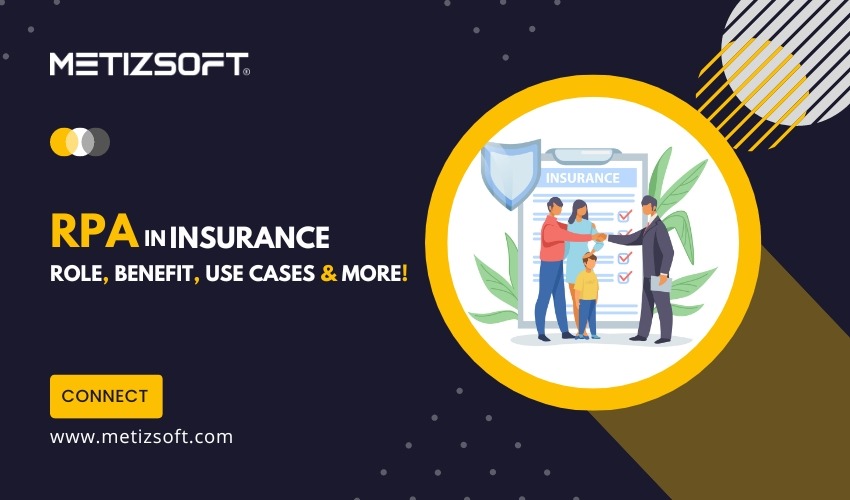
Insurance companies/organizations, in their early days, were heavily accustomed to the most traditional ways of task operations. They were heavily regulated and non-receptive to significant changes. However, the shift towards app-based transactions and heavy commoditization of insurance products has left no choice but to digitize their process.
The challenge didn’t stop them from here. The rapid growth of emerging technologies drives an outcome-focused operations agenda, leaving them at a turning point. However, not all insurers have the culture or capacity to embrace digital transformations quickly.
This forces them to turn to Robotic Process Automation (RPA) as an all-in-one solution. Indeed, RPA has now become the primary driving force for insurance companies.
In this blog post, we will reveal more about the role of RPA in insurance. Specifically, how has this advanced automation technology benefited them, and what is the impact of its game-changing use cases?
Table of Contents
RPA’s role in the insurance industry!
In the insurance industry, Robotic Process Automation automates rule-based and repetitive processes, such as:
- Creating policies
- Collecting deposits
- Extracting data in claims
- Performing background verifications
By leveraging the hyper-automation approach, insurers can also use bots to perform processes that involve decision-making.
RPA bots can efficiently perform tasks such as processing documents, communicating with customers, and verifying KYC.
Additionally, using bots in insurance processing can reduce the risk of human error as bots only perform specific tasks.
How does RPA work in insurance?
RPA improves customer experience and operational efficiency by bridging the gap between legacy insurance systems.
Indeed, deploying RPA bots can streamline business processes and improve accuracy, freeing up human resources for more strategic tasks.
Furthermore, insurance companies rely on legacy applications and systems, which can be linked with RPA to reduce labor costs, conduct operations faster, and explore new areas of business innovation with minimal coding.
Best RPA use cases for insurance!
The insurance industry is one of the sectors that’s embracing RPA with great enthusiasm. Here are some of the top RPA use cases specifically for insurance:
Claim Registration – Claim processing requires gathering extensive data from various sources. However, current claims systems lack flexibility and functionality, leading to significant human involvement in processing.
Fortunately, RPA can automate insurance claim registration. It does this by validating customer data against policy details, assigning claim numbers, and routing requests to relevant investigative teams.
Fraud Detection – The second sole purpose of RPA, apart from overall automation, is to detect fraud within the system. Many insurance companies have lost vast amounts of data and money due to this single cause.
The figures are easy to understand since many organizations still rely on outdated rule-based systems that cannot identify sophisticated fraud schemes. Robotic Process Automation has come to the rescue with its best practices to save them lots of resources and money. Moreover, it scans and quickly detects tiny mistakes and notifies the administrator for quick investigation.
Regulatory Compliance – Insurance companies are regulated by strict laws to standardize the documentation and audit trails. Fortunately, automating high-volume record maintenance with RPA ensures accurate data, compliance, and a complete log of changes.
Consequently, insurers can easily monitor compliance regularly by accessing log files through internal review.
RPA bots can automate the following:
- Client Research
- Customer data validations
- Compliance report generation
- Data security operations
- Account closure notification
Underwriting – Insurance underwriters evaluate and analyze risk. This involves collecting information on people or assets.
By employing Artificial Intelligence (AI) and Machine Learning (ML) enabled RPA bots, they can:
- Add/remove required data in the internal system
- Access critical data from internal/external sections
- Track and analyze customer/client history
- Evaluate loss
- Trigger system at risk and fraudulent cases
This streamlines insurance underwriting for quicker decisions and frees up underwriters for complex tasks.
Finance & Accounts – Insurers commonly deal with billing, payroll, and other financial matters. However, in contrast to the volume of data they deal with, only a few are error-free in this regard.
With RPA bots, there’s minimal, almost zero chance of error in this contrast. Bots can ensure the seamless execution of repetitive tasks like:
- Copying and Pasting Information
- Form fill-ups
- Forwarding Notifications
Additional benefits include minimizing insurance policy and financial transactions and alerts for suspicious claims.
Policy Administration – Policy administration in an insurance company usually includes:
- Rating
- Quoting
- Binding
- Issuing
- Renewing
- Endorsing
If you use policy administration software, you must be aware of the cost associated with maintaining it. In the face of these challenges, the insurance industry often requires assistance to expand its customer base.
RPA can automate transactional and administrative activities such as credit control, tax and regulatory compliance, and accounting settlements. RPA can navigate across multiple applications, saving significant time.
Policy Cancellation – Cancelling policies is a time-consuming and repetitive task for insurance agents who must interact with multiple tools to access data.
With RPA, policy cancellation occurs three times faster in insurance, seamlessly switching through all interactions and providing faster resolutions to customers.
Sales & Distribution – Sales and distribution involve creating sales records and funnel reports, pushing notifications to agents, and overseeing compliance, legal, and credit standing. The manual process earlier is prone to errors, expensive, and requires high maintenance.
RPA can streamline and automate the complex and time-consuming insurance sales and distribution tasks.
Using RPA bots, insurers can:
- Schedule cold calls/emails
- Check legal/credit score
- Conduct compliance
Insurance Process Analytics – A vast number of operational and paper-intensive processes make it challenging for insurers’ agents to track or measure operational efficiency and identify areas for improvement.
With RPA bots, tasks are performed and tracked efficiently. AI bots’ audit trails ensure regulatory compliance and support process improvement.
Query Resolutions – Insurance companies face a high volume of customer inquiries compared to other industries, making timely resolution a cumbersome task for insurance agents. However, using RPA, bots can help insurance agents respond faster.
RPA bots, using predefined rules and natural language technology, can easily interpret incoming calls and emails and resolve simple queries without human intervention.
Benefits of using RPA in the insurance!
Insurers can enhance back-office processes and customer services with RPA while transforming the work environment.
Here are some core benefits that RPA brings to the insurance segment:
Data Accuracy – Automating manual processes with RPA reduces human error and enhances data dependability, which is crucial for regulatory Compliance.
Cost Reduction – Robotic process automation can help companies increase productivity and lower costs while reassigning employees to more vital projects, leading to growth.
Boost Productivity – A range of manual data entry tasks can be eliminated by RPA in insurance bots through advanced document processing. It allows employees to increase their focus on more value-added activities. This leads to an increase in employee morale and productivity.
Quicker Insurance Claim Processing – In the traditional method of processing claims, employees manually collect information from multiple documents and transfer it into other systems.
However, with the advent of RPA bots, large volumes of claims data can be moved with just a single click, resulting in faster response times for customers when they file a claim.
Protect Financial Investments – You can use bots to prolong the useful life of older systems that will soon be retired. These can be set up much more quickly than traditional IT initiatives.
Enhance Cross-selling – RPA tools like chatbots can provide customized product recommendations to enhance customer experience.
Furthermore, one can use RPA for innovative business solutions, such as instantly customizable life insurance and on-demand property coverage.
Top-notch Client Satisfaction – RPA can automate various data-intensive procedures for insurers, such as onboarding new customers and canceling policies, by seamlessly transferring data across multiple systems.
Final Words
RPA can stream the insurance process and integrate legacy applications with modern solutions. By deploying RPA in the insurance industry, insurers can reduce costs and workload and provide fast, personalized, and empathetic customer fast, personalized, and empathetic service they need.
It is high time that insurance companies adapt to the ever-evolving changes and enable RPA in their insurance cycle if you haven’t already. If you are looking for a trusted RPA service provider, Metizsoft Solutions is here for you. Hire RPA experts from us today!
AboutManthan Bhavsar
Related Posts
Robotic Process Automation (RPA) – Definition and Types!
Over the years, humans have been the driving force of all business. They still are, though, with the support of technological...
The Impact of RPA in the Telecom Industry – An Automation Guide!
The inception of 5G and the advancement in the Internet of Things (IoT) led the telecommunication industry to adapt and evolve...

